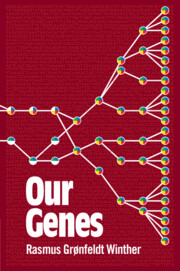Book contents
- Our Genes
- Frontispiece
- Our Genes
- Copyright page
- Dedication
- Contents
- Preface
- 1 Introduction
- 2 Origins and Histories
- 3 The Mind, the Lab, and the Field: Three Kinds of Populations
- 4 Metrics and Measures
- 5 Models and Methodologies
- 6 Six Patterns of Human Genomic Variation
- 7 Natural Selection
- 8 Intelligence, Female Orgasm, and Future Discovery
- 9 Is Race Real?
- 10 The Conscious Universe: Genes in Complex Systems
- References
- Index
- Plate Section (PDF Only)
9 - Is Race Real?
Published online by Cambridge University Press: 14 December 2022
- Our Genes
- Frontispiece
- Our Genes
- Copyright page
- Dedication
- Contents
- Preface
- 1 Introduction
- 2 Origins and Histories
- 3 The Mind, the Lab, and the Field: Three Kinds of Populations
- 4 Metrics and Measures
- 5 Models and Methodologies
- 6 Six Patterns of Human Genomic Variation
- 7 Natural Selection
- 8 Intelligence, Female Orgasm, and Future Discovery
- 9 Is Race Real?
- 10 The Conscious Universe: Genes in Complex Systems
- References
- Index
- Plate Section (PDF Only)
Summary
As we have learned throughout these pages, defining, investigating, and interpreting identity is complex. Many of our questions about Who am I? refer us to our local, geographic population(s) of origins, but just as many refer us to each other, as a whole, and to the human genome we each carry. This chapter zooms out from case study analysis to consider another form of identity that genomics helps us define and investigate – race (Figure 9.1, chapter opener). A book that approaches human evolutionary genomics through a philosophical lens would be incomplete without considering the particularly contentious analyses and interpretations associated with the genomic study of race. Conceived of as a social indicator of varying importance, race is linked to social structures and, thus, politics. Racism is the process of frequent and systemic judgments and prejudices based on perceived racial differences leading to differential access to social goods, including dignity, trust, and opportunity. We can work to ignore race, insist race does not matter, and strive for the post-racial future some of us may long to inhabit, but we do not live there yet, and a variety of futures are possible.
- Type
- Chapter
- Information
- Our GenesA Philosophical Perspective on Human Evolutionary Genomics, pp. 262 - 283Publisher: Cambridge University PressPrint publication year: 2022

